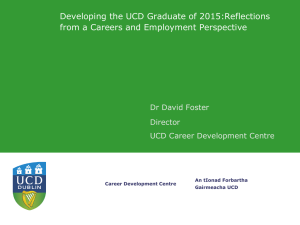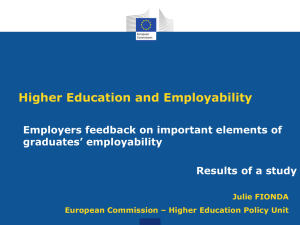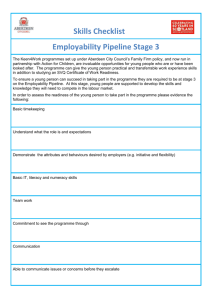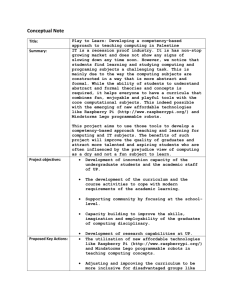PP Employability - Preparatory Document
advertisement
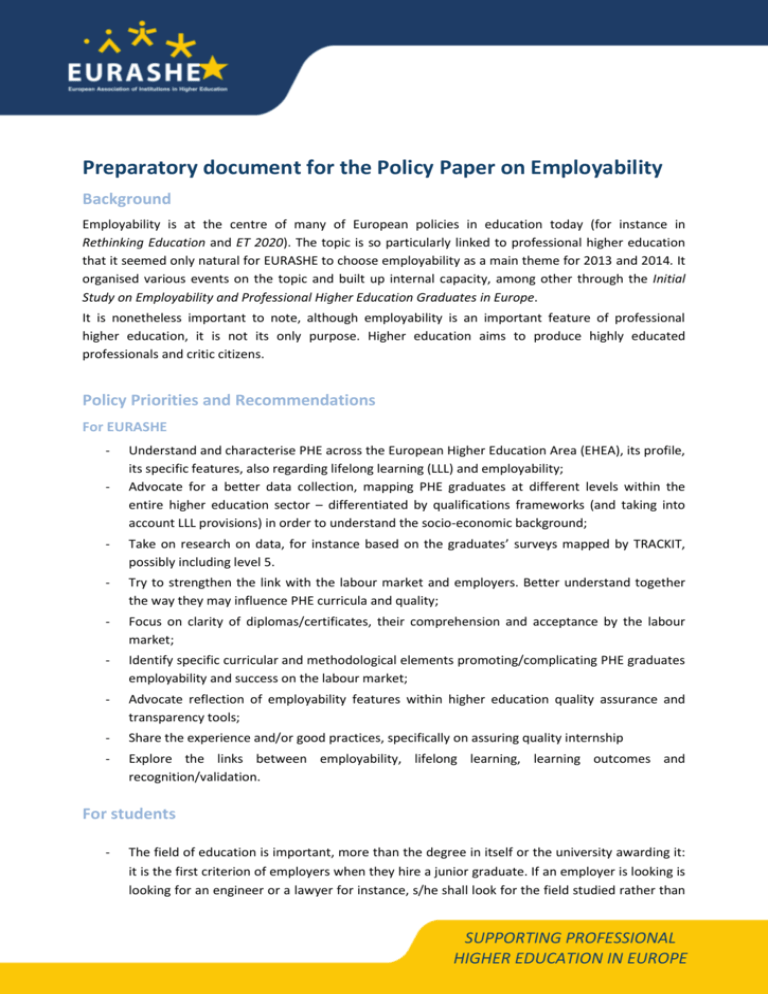
Preparatory document for the Policy Paper on Employability Background Employability is at the centre of many of European policies in education today (for instance in Rethinking Education and ET 2020). The topic is so particularly linked to professional higher education that it seemed only natural for EURASHE to choose employability as a main theme for 2013 and 2014. It organised various events on the topic and built up internal capacity, among other through the Initial Study on Employability and Professional Higher Education Graduates in Europe. It is nonetheless important to note, although employability is an important feature of professional higher education, it is not its only purpose. Higher education aims to produce highly educated professionals and critic citizens. Policy Priorities and Recommendations For EURASHE - Understand and characterise PHE across the European Higher Education Area (EHEA), its profile, its specific features, also regarding lifelong learning (LLL) and employability; Advocate for a better data collection, mapping PHE graduates at different levels within the entire higher education sector – differentiated by qualifications frameworks (and taking into account LLL provisions) in order to understand the socio-economic background; - Take on research on data, for instance based on the graduates’ surveys mapped by TRACKIT, possibly including level 5. - Try to strengthen the link with the labour market and employers. Better understand together the way they may influence PHE curricula and quality; - Focus on clarity of diplomas/certificates, their comprehension and acceptance by the labour market; - Identify specific curricular and methodological elements promoting/complicating PHE graduates employability and success on the labour market; - Advocate reflection of employability features within higher education quality assurance and transparency tools; - Share the experience and/or good practices, specifically on assuring quality internship - Explore the links between employability, lifelong learning, learning outcomes and recognition/validation. For students - The field of education is important, more than the degree in itself or the university awarding it: it is the first criterion of employers when they hire a junior graduate. If an employer is looking is looking for an engineer or a lawyer for instance, s/he shall look for the field studied rather than SUPPORTING PROFESSIONAL HIGHER EDUCATION IN EUROPE - the level of qualification, or if the track is professional or academic. It is important to choose wisely the field studied, according to your career plans. Consider PHE, it is a very valuable degree on the labour market, about half of the employers favour bachelor graduates, especially for professional profiles. For higher education institutions - - - - To facilitate students’ mobility and transparency of the qualification in the labour market, it is important that PHEI maintain high quality qualifications, compatible with the EQF. By proceeding by learning outcomes pedagogy, PHE can ensure transparency for all stakeholders: the students, teaching staff, external assessors and employers. Having a way to combine study with some relevant work experience, such as including internships systematically in the programmes, and ensure their quality for all students. Promote PHE, show its assets in fairs etc. Foster cooperation with employers through research, teaching, work-placement, but also in the governing Board, for the design of the programmes and their financing. Employers are also a source of information about new developments and future skills. Be accessible for disadvantaged background students, atypical students and older students through scholarships, low fees, evening classes and distance teaching as part of blended learning and by taking care of flexible learning pathways for ‘lifelong learners’. It is important to counterbalance the gender and age bias through quality education. Develop a strong alumni network. They can serve as bridge between the institution and the labour market. They are also a valuable resource for students to know the kind of jobs their studies lead to, to find internships and work opportunities. For employers - Develop good relationship with higher education institutions, it can bring mutual benefits. The more employers are involved with HEI, the more the graduates will be in line with your expectations. Education is a shared responsibility. For policy makers - - Support PHE, it is a valuable means to increase employability, especially among a population who would not access higher education without it. The support must be financial but also, and maybe more importantly, a major change must be made in the mentalities of some countries where PHE is considered a second class higher education despite its results. The support could also be improved regarding short term mobility, to ensure the attractiveness of PHE. Support HEI to implement European tools such as EQF or learning outcomes. EURASHE Secretariat Ravensteingalerij 27/3 1000 Brussels Belgium Tel: 0032 (0)2 211 41 97 Fax: 0032 (0)2 211 41 99 eurashe@eurashe.eu www.eurashe.eu - - Organise structural meetings, platforms for HEI representative and employers and entrepreneurs to meet. The European Union should support the collection of data regarding employability of graduates, according to the type of higher education. The results should then be published widely, so as to make it accessible to prospective students and be used by policy makers nationally. The European Union can also support PHE and SCHE by focusing more on their specificities. It should support it also through the exchange of best practices, offering platform to discuss national developments regarding QA, internships, mobility, pedagogical approaches etc. SUPPORTING PROFESSIONAL HIGHER EDUCATION IN EUROPE
